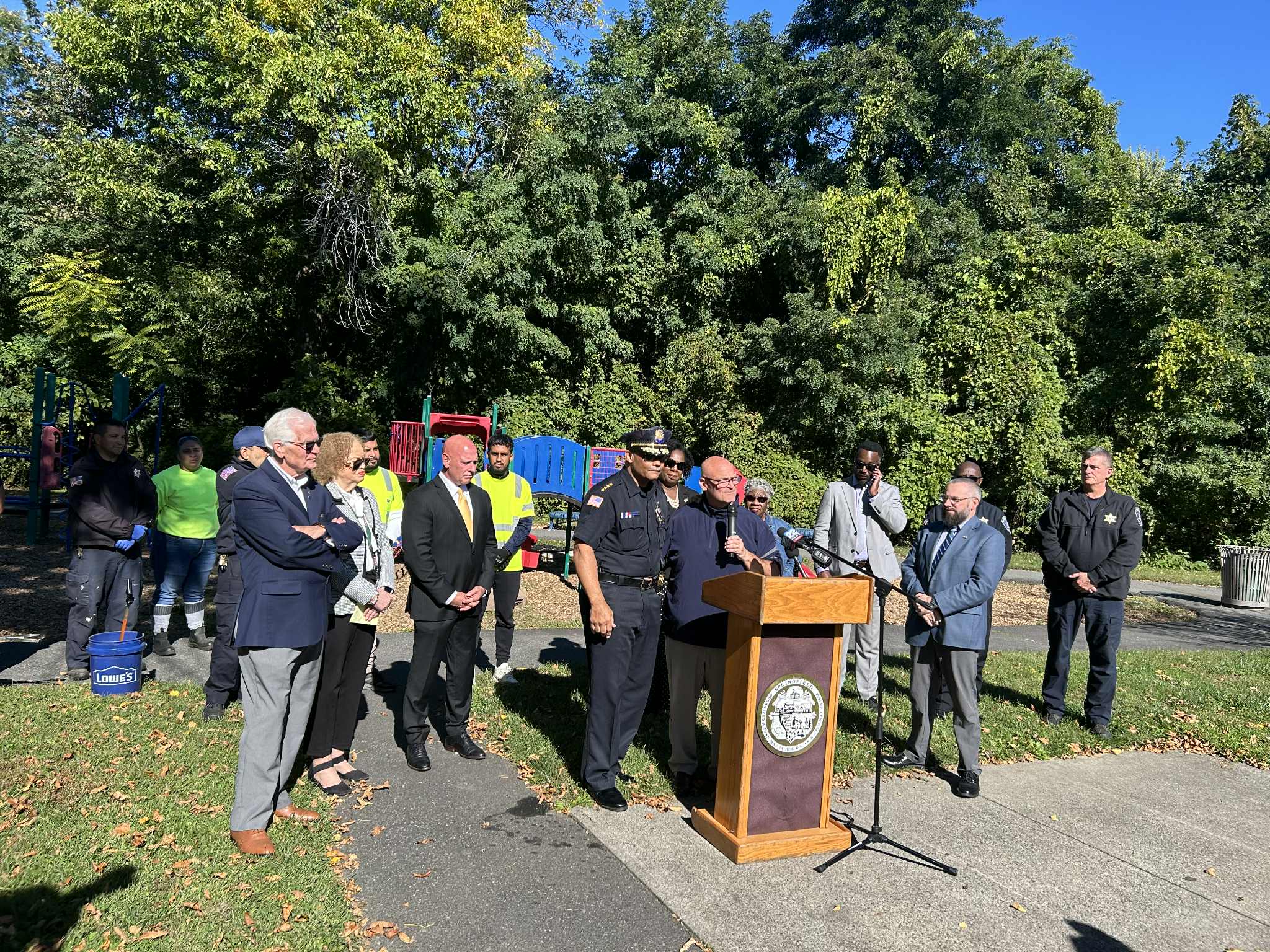Sheriff Nick Cocchi joins Springfield city leaders on Oct. 1 at Johnny Appleseed Park to announce a new iniaitive that will help eliminate drug paraphanelia issues across Springfield’s parks and churches.
Reminder Publishing photo by Ryan Feyre
SPRINGFIELD — What’s been a monthslong battle against drug paraphernalia has now culminated in an expanded partnership between the city and Hampden County Sheriff’s Department.
At an Oct. 1 press conference in front of Johnny Appleseed Park, Health and Human Services Commissioner Helen Caulton-Harris announced that the city will use seed money to hire a harm reduction specialist to help eradicate the drug and alcohol paraphernalia problem found in parks throughout the city.
Caulton-Harris shared that the person hired for the position will work year-round with Tapestry Health, Gandara Center and the New North Citizens Council on needle recovery in places like churches and parks.
She added that the position will also help individuals find the right treatment for substance use disorders, and a phone number will be available for residents to call when they see discarded needles.
“We don’t want to put Band-Aids on anything in this city,” Caulton-Harris said. “Where there’s a need, we want to be the ones to create a comprehensive response. And that is what this is.”
Caulton-Harris joined Hampden County Sheriff Nick Cocchi, Springfield Public Schools Superintendent Sonia Dinnall, Mayor Domenic Sarno’s office, Parks, Buildings and Recreation Management Director Tom Ashe and City Councilors to announce a multi-faceted partnership to combat the citywide issue.
Ashe has said in the past that the city’s crews already spend every day cleaning up big trash and little trash across the 52 parks across the city. This expanded partnership with the sheriff’s office and the city will further mitigate, and hopefully eliminate the problem, according to those present at the press conference.
“We are here every single day cleaning up our parks,” Ashe said, “We are 100% firmly committed to making sure all our particular parks are clean, secure and safe for families.”
Aside from hiring a new harm reduction specialist, Ashe said the city is providing $25,000 in seed money to the sheriff’s office, which will allow Cocchi’s staff to pick up needles, cans of beer and any other kind of paraphernalia that they may find.
Cocchi shared that there will be two or three staff members picking up trash in parks where a problem is identified. The staff will consist of individuals in a minimum-security facility working with community restitution supervisors.
Ashe said that when the $25,000 seed money runs out, the city will likely ask the City Council to appropriate more money to continue the partnership.
“One needle on the ground is one too many,” Cocchi said. “We’re going to find these things. We’re going to get rid of them. We’re going to clean the parks up, and we’re going to encourage the children and the community members to come back to the parks.”
The announcement of these initiatives comes at a time when Ward 5 City Councilor Lavar Click-Bruce and At-Large City Councilor Brian Santaniello are working on a resolution that urges the Massachusetts state Legislature to create stricter laws around drug paraphernalia near playgrounds and schools.
The current state law states that drug activity must occur within 300 feet of a school zone and 100 feet within a playground for that person to be in violation of the statute. Click-Bruce and Santaniello’s resolution urges the state to increase that distance to 500 feet for both.
The law also states that there are no drug-free zones between the hours of midnight and 5 a.m., and a threat of violence must emerge during a drug transaction to qualify as a violation of the statute. The councilors’ resolution advocates for the elimination of those requirements, thereby streamlining and simplifying the process of catching perpetrators.
According to the resolution, the councilors want to make sure that the statute applies to all drug possession and drug sales taking place within 500 feet of a school, park or playground, regardless of time of day or the specific background circumstances of the crime.
The resolution is currently being discussed at the subcommittee level before the full City Council takes it up for a vote. If the resolution passes the council, it will head to the state Legislature. In the event that no action is taken at the state level, the city of Springfield could file a home rule petition under Massachusetts law.
“We in Springfield and Hartford, Connecticut, are a hub to I-91 for drug distribution,” said Santaniello, during a September council meeting. “So, we looked at the drug-free zone to see if we could start protecting our children who go to school in those areas, our senior citizens [and] people who use our parks and playgrounds.”
Click-Bruce, a varsity basketball coach at John Duggan Academy, said during the Sept. 15 council meeting that he and the players who participate in summer basketball leagues have seen the drug paraphernalia firsthand.
He has said in the past that he is not in the business of giving drug dealers business hours.
“For me, it’s always been about safety,” Click-Bruce said at the Oct. 1 press conference. “I know folks have mental health issues, and we can deal with that on a different level. However, I want to address the needs of our constituents who want to frequent the parks, and enjoy a slide, and enjoy a basketball game or enjoy a walk. They don’t have to worry about getting pricked by a needle.”


